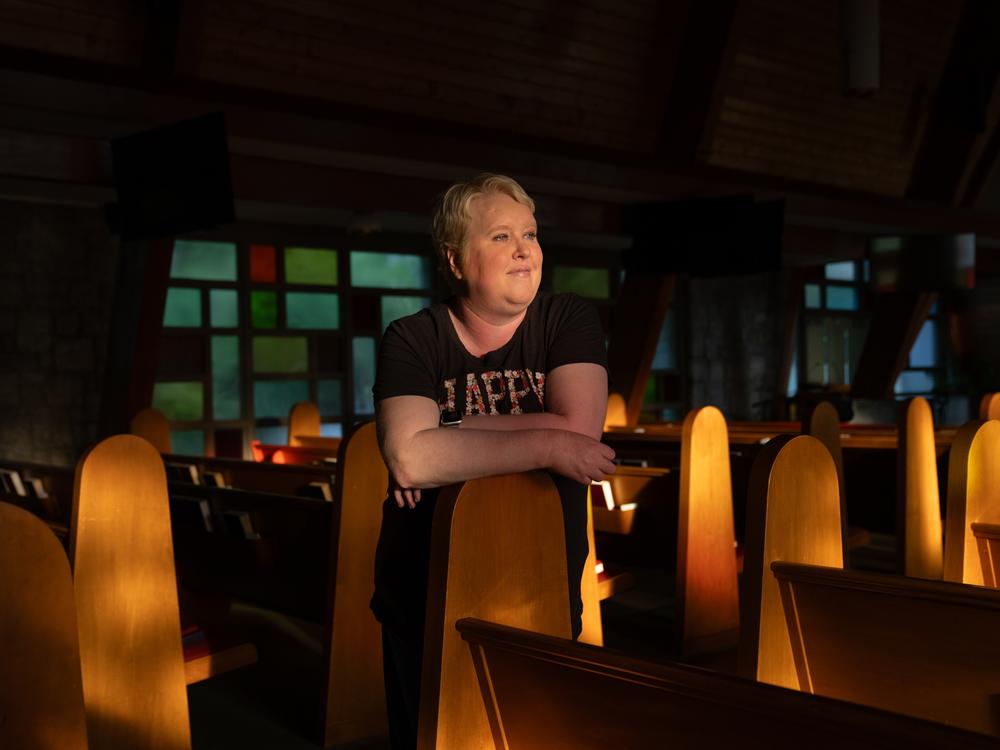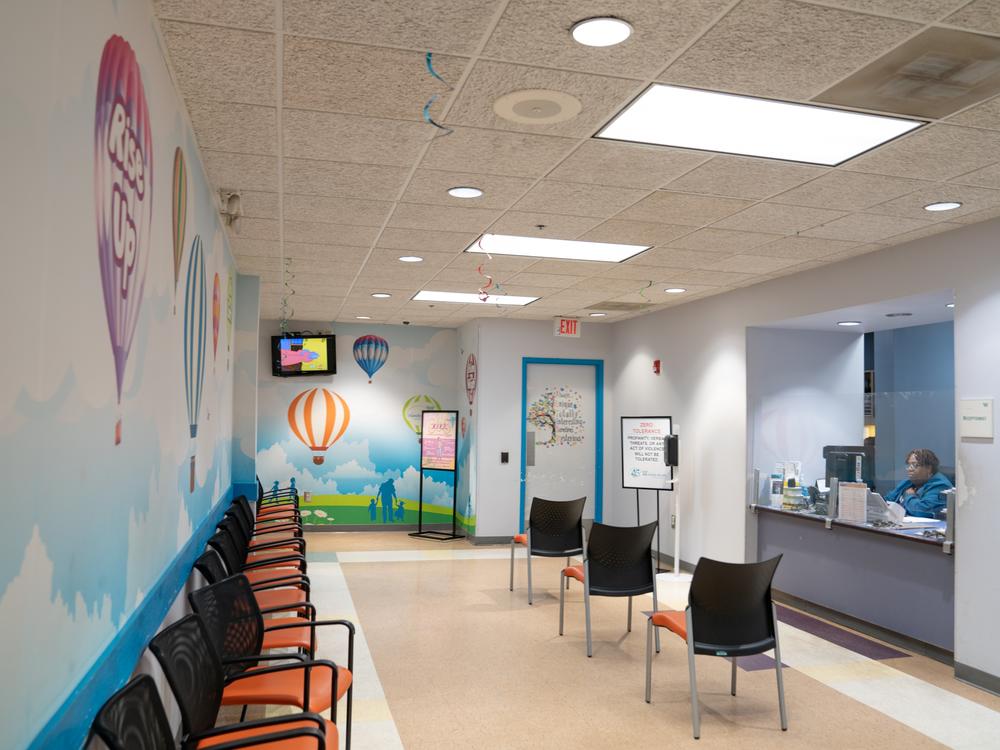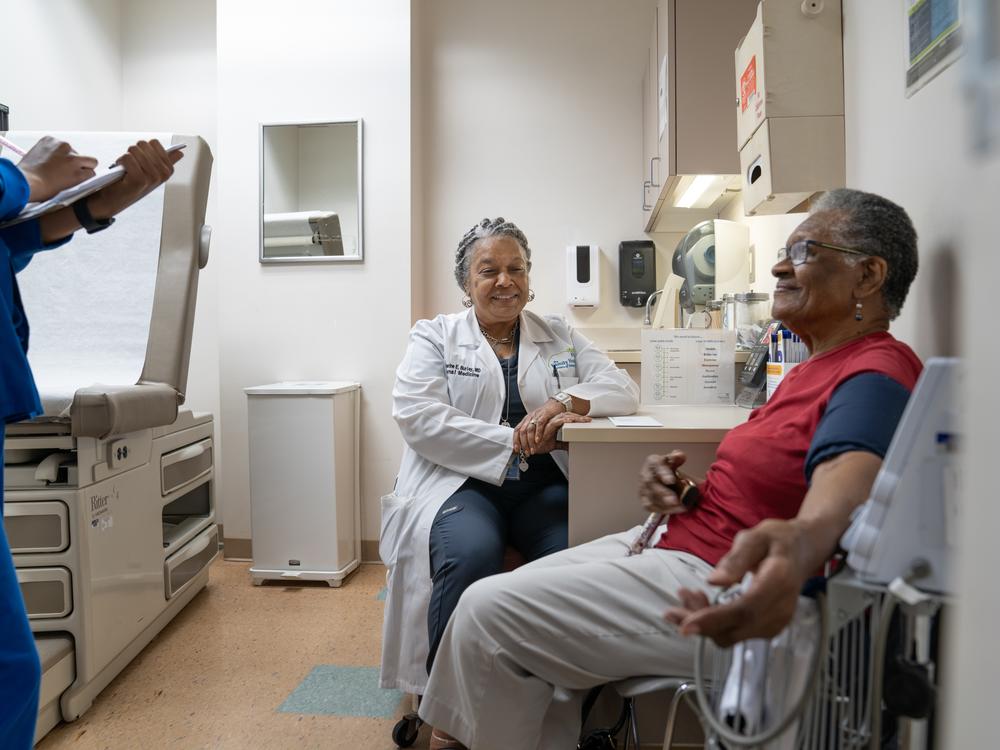Section Branding
Header Content
$30 too much a month keeps a cancer patient in Georgia from cheaper care
Primary Content
DECATUR, Georgia – Amy Wilson stood before the all-volunteer Atlanta Philharmonic Orchestra at a recent rehearsal in the basement of a church.
Wilson, the group’s conductor, listened carefully for off-key notes as the sound of violins, cellos and flutes filled the air.
“I tell them, 'If you’re going to make a mistake, make it loud,'” Wilson said. “Don’t play timidly. Make it loud, so that we can fix it because, if I can’t hear it, I can’t fix it.”
Being a musical conductor is what she’s wanted to do since middle school. Her love of music was born from singing in a church choir and learning how to play piano.
Four years ago, her life and dream were put in jeopardy when doctors found a cancerous tumor in her brain. She had two choices: forgo chemo and surgery and possibly lose her life or get treatment and figure out how to pay for it later.
She ended up having surgery a few weeks before the coronavirus pandemic shut down Georgia and most of the world. Wilson was already on Medicare because of an existing disability, and it covered some of her surgery expenses, but Wilson still struggles to pay for her ongoing care.
“My life was good before brain cancer and I miss it,” Wilson said.
While recovery would’ve been its own challenge, Wilson says things could’ve been smoother if she hadn’t been denied Medicaid, the state-federal program that provides health coverage to low-income people.
The last time she applied, Wilson was told her income was $30 over Georgia’s Medicaid limit.
An estimated 1.5 million low-income U.S. adults with incomes over Medicaid’s limit. About 12% of these adults live in Georgia, according to health research nonprofit KFF.
Georgia is one of 10, mostly southern and GOP-led states, that have not expanded Medicaid to cover more people under President Barack Obama’s signature law, the Affordable Care Act, also known as Obamacare. The other states are Texas, Alabama, Mississippi, South Carolina, Florida, Tennessee, Kansas, Wyoming and Wisconsin.
Democrat Stacey Abrams made Medicaid’s expansion a key issue in her two failed attempts to win the Georgia governor’s seat, losing out both times to Republican Gov. Brian Kemp, who has insisted he will not expand the program. And recently, President Joe Biden has been attacking Donald Trump over his attempts to repeal Obamacare, hoping the issue will galvanize voters as he scraps for votes in battleground states.
So why has Georgia rebuffed Medicaid expansion?
At his budget signing in early May, surrounded by local and national reporters, Gov. Kemp said that “expanding Medicaid will take people off of their private sector insurance and put them on the government-run health care. That is going to cost more money in the short term, more money in the long term. So to me that does not make good budgeting sense to do that.”
Instead, Kemp introduced Georgia Pathways to Coverage last July, which he referred to as a “conservative Medicaid expansion,” a plan done under a waiver in the ACA. Former President Donald Trump signed off on it while in office in 2020.
Medicaid expansion in Georgia would make people earning up to 138% of the federal poverty level – which is $20,782.80 for an individual and $43,056.00 for a family of four – eligible for coverage.
Pathways makes people earning up to 100% of the federal poverty level – or $15,060.00 for an individual and $31,200.00 for a family of four – eligible for Medicaid. But applicants must also show they’ve completed 80 hours per month of qualifying activities, including full- or part-time employment, higher education, or vocational training — a requirement opposed by some Democrats and health advocates.
The program was expected to register about 100,000 Georgia residents in its first year, according to member station Georgia Public Broadcasting. Near the end of 2023, only around 2,300 people had signed up, according to a report from the Georgia Department of Community Health.
At the budget signing, Kemp told reporters that the program was “just getting started,” placing some blame on a December 2021 effort by the Biden administration to delay Pathways’ implementation over the work requirement. A judge ruled the following year that it could be implemented.
Pathways wasn’t available when Wilson of the Atlanta Philharmonic Orchestra was undergoing her brain cancer treatments. And even if the Pathways program had been available, she worries she wouldn’t have been able to meet the work requirement due to disability that predates her cancer diagnosis.
“I’m not physically able to do any of those things for 20 hours a week,” Wilson said. “I struggle to do what I do, which is like five hours a week.”
How a Georgia doctor says a full Medicaid expansion could help patients
Many Georgia residents with medical needs who don’t qualify for Medicaid may not be getting diagnosed or treated in a timely manner, according to Dr. Catherine Burley, chief of adult medicine at the Family Health Centers of Georgia, a nonprofit clinic.
Burley, who has worked in medicine for 43 years, said expanding Medicaid could mean more people getting basic medical care, including preventive services that could keep their conditions from worsening in the long run. She acknowledges, though, there are some expenses Medicaid sometimes doesn't cover, like physical therapy and some medicine, which can be a struggle for her diabetic patients.
“If you can get treatment early, that definitely affects your long-term outcome,” Burley said. She believes morbidity and mortality rates could improve, and that people with diabetes and high blood pressure might reduce their risks of things like strokes, heart attacks or amputations.
Right now, some of the most impoverished people in the state are missing out on care, Burley says, adding that there are plenty of adults who are afraid to go into the workforce because they worry they will lose the Medicaid coverage they have now, reserved only for the lowest income adults.
“You know, it’s very easy to get Medicaid for pregnancy and for children, but for adults, that’s a major hurdle — and especially for adult men,” Burley said. “And I think it’s because people feel they ought to be out working, but sometimes they’re not able to do that.”
Some health advocates say the stakes of Medicaid’s expansion are enormous
“I've talked with Georgians who have died because they couldn't get Medicaid until after they had Stage 4cancer and it was too late to keep them alive,” said Liz Ernst of advocacy group Protect Our Care Georgia.
“I've talked to Georgians who, you know, lost their jobs because they couldn't stay healthy and become homeless,” she continued. “It's a really sad state of affairs here in Georgia.”
The group has pushed for Medicaid’s expansion for years, with this year being another missed opportunity. Ernst was disappointed at the end of the legislative session in March.
A bill that would have expanded Medicaid through purchasing private health insurance plans for uninsured adults failed in committee at the last minute, though it had some Republican support.
“The legislature clearly showed us that there was a will and a desire to expand Medicaid,” Ernst said.
As things stand now, Georgians who earn too much money to qualify for Medicaid are left in the same gap they’ve likely been in for years. Changing this current all-or-nothing approach is exactly what Wilson says she wants.
But beyond all of that, as someone suffering from such complex health problems – she was diagnosed with lymphoma after her brain cancer – she just wishes she didn’t have to think about any of this.
“I feel like having access to good, affordable health care should be a human right, that everyone should have, that regardless of their income, regardless of their ability to work or their inability to work,” Wilson said. “I feel that no one should be suffering because they can't afford to pay or they make $30 over the income limit or because we didn't expand Medicaid.”
The story was adapted for web by Majd Al-Waheidi.



